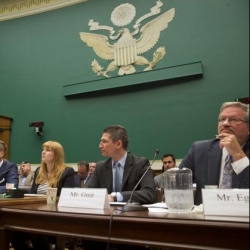Members of the United States Congress met on Wednesday to discuss possible laws regarding daily fantasy sports. The hearings took place in a House Energy & Commerce subcommittee. US Representative Frank Pallone of New Jersey requested the hearing.
The name of the hearing was “Daily Fantasy Sports: Issues and Perspectives”. A variety of experts were called to testify. Pallone wanted the issue discussed, because 12 US states now considered DFS gaming to be illegal: Alabama, Arizona, New York, Louisiana, Mississippi, Montana, Hawaii, Iowa, Texas, Idaho, Nevada, and Washington.
Daily fantasy sports is a multi-billion dollar business in the United States. Companies like DraftKings and FanDuel spend millions of dollars on advertising, which seems to be everywhere during televised sports broadcasts.
One-Day Fantasy Sports
Players compete on these sites in one-day fantasy leagues, much like players have competed in yearly “local” leagues for decades. Most of the contestants on DFS sites end up losing money to “grinders”, competitors who have more time, better technology, and better statistical models on which to rate the odds.
DFS Regulations Discussed
The hearings on Wednesday were to discuss whether such activities should be regulated by the federal government. Most of the discussion focused on legalization and regulation, instead of a strict ban on daily fantasy sports. As a commerce subcommittee hearing, most points had to do with the interstate commerce part of the DFS industry.
The dangers of the daily fantasy sports was discussed. 50 million Americans or more than 1 in 7 Americans partake in fantasy sports each year. Given its popularity and the sustained time for the wagers to play out, few lawmakers have seen much harm in bets made on yearly fantasy football and baseball leagues. Playing every day, or even multiple times per day, leads to the possibility of problem gambling.
Faced with increasing criticism and scrutiny from state governments, DraftKings and FanDuel have made concessions towards fairness, transparency, and compulsive play. What they have no been willing to admit is their hobby is “gambling”, instead of “gaming”. DraftKings and FanDuel do not want to be considered in the same light as sports betting, which is banned in 46 states. They argue that sports betting is based on an either/or scenario in a game, while fantasy sports is an aggregate of many factors in a many games — and thus lends itself to more skill .
Frank Pallone on Daily Fantasy Sports
Frank Pallone addressed issues of fairness at the hearing on Wednesday. When it was his turn to speak, Pallone said, “It is crucial that consumers know what they are purchasing when they sign up for (daily fantasy games) and that they understand the risk of losing money in the process. For example, there are reports that 90 percent of payouts were won by just 1 percent of winners.”
While some point to the fact that grinders collect 91% of the revenues in contests as a sign the hobby is unfair, the DFS companies point to the same statistic to show that their game is a definite “game of skill”. If it was not, a certain group of players could not win so consistently.
Fred Upton Calls for Regulation
Rep. Fred Upton of Michigan called for a sensible regulatory framework at the federal level, because a patchwork approach to 50 states might create problems.
Upton said, “We must keep in mind that a patchwork of differing and contradictory state laws has the potential to negatively impact consumers, and harm further growth and innovation in the process.”
Distinctions between DFS and Sport Betting
One thing is certain: the DFS debate has redrawn the lines from the typical sports betting issue. The top American sports associations have sued the state of New Jersey, claiming unfettered sports betting across 50 states would undermine the integrity of their games. Yet the National Basketball Association, Major League Baseball, and National Hockey League each have corporate sponsorships with either FanDuel or DraftKings. Even though the NFL has no deal, Jerry Jones of the Dallas Cowboys and Robert Kraft of the New England Patriots each have equity in DraftKings.
Daily fantasy sports is in the cross-hairs of American officials. Yet the debate is much different than it would be if the discussion was the legalization of online sportsbooks. Of course, the recent news that Restore America’s Wire Act might be attached to the Appropriations Bill is a sign that any discussion on Capital Hill could lead to trouble.

